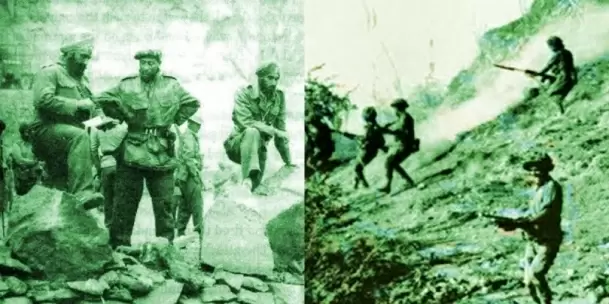Victory at Shalateng: How Indian Troops Defeated Invaders in 20 Minutes
07-November-2024

A fortnight after the Pashtun tribal invasion of Jammu and Kashmir, Srinagar had been saved by the resolute action of some gallant Indian soldiers, but the danger had only been averted as the invaders were still around. It then took Indian troops less than half an hour on November 7, 1947, to defeat them decisively and chase them out of the Kashmir Valley.
This came at the Battle of Shalateng - the outcome of a risky gambit - and careful planning - by the Indian commander, (then) Brigadier L.P. 'Bogey' Sen, who stood up to doubts, his fiery superior's wrath, and political appeals for his dismissal - aided by Sardar Vallabhbhai's confidence in him.
The sacrifices by J&K forces' Chief of Staff, Brig Rajinder Singh Jamwal on the Jhelum Valley Road, Lt Col Dewan Rajit Rai, who led the first Indian troops into the Valley, at Patan on October 27, and Major Somnath Sharma at the Battle of Budgam on November 3, ensured Srinagar, and its airstrip, were still in Indian hands. But the tribals were still around and a threat.
Brig Sen, who had taken over 161 Brigade on November 2, realised that skirmishes would only whittle down his limited strength and recalled the parting advice by Delhi and East Punjab Command chief, Lt Gen Dudley 'Pasha' Russell that "if you get a chance of hitting them, hit hard with all you have got and don’t let up".
In his memoirs, "Slender Was The Thread", he recalled that for this he had to make the enemy combine and a tempting figured that a tempting bait would be an open road to Srinagar so they could swoop down in their vehicles to loot the city.
This meant ordering the troops on the Srinagar-Baramula road to fall back and the order created a storm. His superior, J&K Force commander, the capable and irascible Maj Gen Kulwant Singh Datta stormed into his HQ early on November 5 and bluntly said this was "sheer suicide" as the raiders would sweep down on Srinagar. He sought a written statement - in triplicate - that the withdrawal was unapproved by HQs.
Meanwhile, Sheikh Abdullah sent an emissary to Delhi to ask Prime Minister Jawaharlal Nehru to replace Brig Sen. However, Sardar Patel, who had gone to Srinagar and had been briefed by the Brigadier, dismissed the request.
On the ground, Brig Sen found that his plan seemed to be working as raiders were seen returning to Baramulla to regroup. He was planning how to deploy his limited forces - three battalions-odd, augmented by some National Conference workers, who carried out risky intelligence operations, when an Armoured Corps officer walked into his ops room.
Major Inderjit Rikhye said that his armoured car squadron had been leading the reinforcements from Jammu but given the Ramban bridge's condition, he had left the force to reinforce it and made for Srinagar with just a troop (four armoured cars) and a rifle troop.
Though just two armoured cars were working, they and the rifle troop - which luckily happened to be Jats, were sent behind the enemy lines. It was a hazardous trip - detachment commander, 19-year-old Lt Noel David reported that they had to cross the stream over a narrow wooden bridge, which didn't appear to be able to support the weight. However, in five minutes, he reported that they could cross if the railings were knocked off.
It was then found that the bridge was just two inches wider, on either side, for the vehicles but he persevered, reporting that they had crossed "but would never like to try doing it again".
By November 7 morning, his detachment was amid the enemy in the village of Shalateng and taken to be reinforcements from Pakistan.
As soon as they were in position, Brig Sen ordered 1 Sikh to advance and hit the enemy hard. 1 Kumaon then made a flank attack, Lt David's force opened fire from their rear, and elements of 4 Kumaon attacked on the other side. The Air Force also bombed the enemy, sending them fleeing.
"The Battle of Shalateng had been won, in twenty minutes from the word GO," Brig Sen said, noting over 600 tribals were killed on the battlefield and in their headlong retreat, while abandoning nearly 140 transport vehicles and a large stock of weapons.
The Indian troops pursued the enemy through the night, retaking an abandoned and devastated Baramula the next morning, and then, Uri.
The Jammu and Kashmir war was not over, as desperate struggles would rage in Jammu and Ladakh for the rest of the year and the following year, as Pakistan would jump into hostilities, but the Kashmir Valley would face no more threats. - IANS
Suspended Kerala IAS Officer Prasanth Raises Promotion Demand During Hearing
How BluSmart Promoters Diverted EV Loans, Bought Flat In DLF Camellias
Homegrown Coffee Chain Nothing Before Coffee Raises $2.3 Million Funding
Supreme Court to Hear Pleas Challenging Waqf Act 2025 Today
Kerala Minister Slams NCERT for Hindi Titles in English Textbooks








